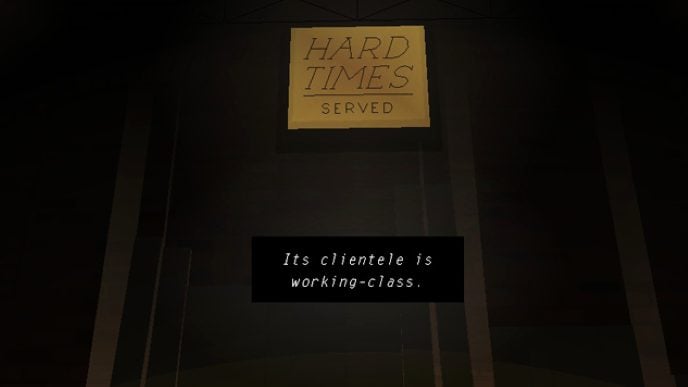Kentucky Route Zero Is the Rare Story that Sheds Light on the Experiences of Millennials of Color

Like many people, I first played Kentucky Route Zero when the TV edition came out this past January. Despite its fame, it isn’t a game that immediately clicked with me and a few other first-time players I know. But, if it clicked, it interestingly clicked around the same time: during “The Entertainment,” the interlude between episodes two and three. I suspect it might be due to its discussions on family, class immobility and a debt experience that many millennials—especially people of color—can relate to so deeply years later.
“The Entertainment” is split into four scenes that take place in a bar called The Lower Depths. At the start of the second scene walks in a woman named Pearl Slade, fit in professional clothing that contrasts the everyday casual clothes of the barkeeper and patron chatting with him. “Are the old folks here?” she says as she sits down. Throughout every minute she is on screen, there’s a visibly anxious energy to her; she’s unable to stop tapping the table. I recognize it immediately because I, too, stim. My leg is perpetually bouncing, for it’s the only way I know how to handle the anxiety in my body at all times.
The “old folks” she’s referring to are her parents, Rosa and Lawrence, who frequent the bar and supply their alcoholism with Pearl’s money. She describes them as deadbeats, though I feel this is a description that applies to Lawrence more. Rosa has worked at a supermarket store for the past 11 years, only just recently having been told she’s “maybe eventually management material. “Keep your chin up,” her boss tells her. I empathize with her. In her I see my mother, who works at a supermarket and suffers screaming customers, supervisors without a shred of empathy, and the physical pain that comes with consistently carrying heavy objects and standing in one place for hours without end; who was told from her first day at work that there was no chance of her moving up in the company (at least she knew from day one! how lucky!). I see the millions of women who work two, three times as hard as the men in their workplaces and are stringed along with promises of promotions and financial security only to never get them.
Rosa knows this, and it’s why she’s hesitant in contrast to Lawrence’s insistence on celebrating the occasion by downing Hard Times whiskey. A part of me understands him, too—understands his desire to find any escape from the systems that oppress brown and black families like this one, restricting them from social mobility and opportunities for stability.
But I most strongly understand Pearl and the responsibility that has fallen on her to take care of her parents. She’s the ambassador of a new financial technology at a local pawn shop, which utilizes her as the one dark-skinned clerk in the office to make poor black and brown people—who struggle to get loans otherwise—feel safe in coming to the business with their debts. Debts are something she knows well enough to be an ambassador in—not just because it’s her actual job, but also because she takes care of her family’s debts. She’s paid to supply their addiction and minimize their bar tabs and debts. “I know debt, Harry,” she tells the bartender. “I see it all day. It’s all around me, like a thick, gray, fog. It’s in the air I breathe.”
She knows it so well because she lives the reality of many millennials of color today.

According to a Merrill Lynch and Age Wave report, 70% of early adults received financial support from their parents in the last year. The same report indicates that roughly a quarter of millennials receive financial support from their parents, with 13% saying their parents pay all of their rent or mortgage and 10% reporting their parents pay for their student loans. But this is largely the reality of more white than non-white middle class millennials, for Hispanic and Black millennials face an additional layer of economic struggles that prevent them from getting ahead.
Black and Hispanic millennials are less likely to receive financial help from their parents. Additionally, their parents are more likely than white parents to expect financial support, with approximately 80 percent of black parents and 70 percent of Hispanic parents having these expectations. Various studies have shown that people of color are unable to save as adults largely because they financially support close family.
 Keep scrolling for more great stories.
Keep scrolling for more great stories.
